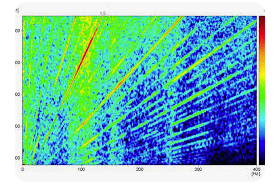gt86
Mechanical
- May 4, 2024
- 7
Hello,
First, I am so glad I found this forum! I am a mechanical engineer/auto enthusiast and I am trying to diagnose vibration problems. I've done a bit of research so not entirely starting from scratch, but have a few questions:
1. When it says to determine if the vibration is engine speed or vehicle speed, you're told to get the car to rpm that causes the vibration and then put it in neutral and see if the vibration continues. If it does, it's vehicle speed related. Question: When putting in neutral, do you maintain the rpm or do you let it go to idle (while the car the continues to coast)? I'm guessing you'd let it go to idle so you're only getting movement (and therefore vibration) from the driveline elements. Please correct me if I'm wrong
2. I have an 8 cylinder van that I am trying to diagnose. I used an iPhone app and placed it on the floor (no carpet) in front of the drivers seat. (the vibration can be felt while seated). At 2400-2500 rpm (40-41Hz), I get highest amplitude vibrations at 41 Hz, 39.8 Hz, and 38.6 Hz. After reaching 2500 rpm and putting the car in neutral and not maintaining rpms, so ~800 rpm, I got readings of 22 Hz, 1.95 Hz, and 20.3 Hz. In neutral and maintaining 24-2500 rpm, I get 21 Hz. Finally, to make it even more confusing, in neutral,at 2400 rpm not moving (so parked in the driveway I get 40 Hz again.
2a. My interpretation of this is... there's a first order engine vibration at 40Hz - does that mean something is vibrating once per crankshaft turn? and there's possibly a 1/2 order engine vibration at 21Hz - is that related to cylinder or other timing issue?
2b. I suspect there may be multiple issues going on because the vibration is intermittent and when getting to 2500 rpm and putting it in neutral, vibration seemed to be reduced (although looking at the data above, they might not be, so that is why I think it may be more than one source). Am I on the right track? Does anyone have any suggestions or advice for me to further isolate this issue/s?
3. Say in a perfect world there were no abnormal vibrations. If I ran an EVA on the vehicle at 2500 rpm, what values would I expect to see? 0 Hz? Lots of low amplitude vibrations, (ie, no peak amplitudes)? (With this question, I am trying to understand what an abnormal vibration would show up as, as opposed to a "healthy" vibration)
Appreciate any and all insight and thank you very much for reading!
First, I am so glad I found this forum! I am a mechanical engineer/auto enthusiast and I am trying to diagnose vibration problems. I've done a bit of research so not entirely starting from scratch, but have a few questions:
1. When it says to determine if the vibration is engine speed or vehicle speed, you're told to get the car to rpm that causes the vibration and then put it in neutral and see if the vibration continues. If it does, it's vehicle speed related. Question: When putting in neutral, do you maintain the rpm or do you let it go to idle (while the car the continues to coast)? I'm guessing you'd let it go to idle so you're only getting movement (and therefore vibration) from the driveline elements. Please correct me if I'm wrong
2. I have an 8 cylinder van that I am trying to diagnose. I used an iPhone app and placed it on the floor (no carpet) in front of the drivers seat. (the vibration can be felt while seated). At 2400-2500 rpm (40-41Hz), I get highest amplitude vibrations at 41 Hz, 39.8 Hz, and 38.6 Hz. After reaching 2500 rpm and putting the car in neutral and not maintaining rpms, so ~800 rpm, I got readings of 22 Hz, 1.95 Hz, and 20.3 Hz. In neutral and maintaining 24-2500 rpm, I get 21 Hz. Finally, to make it even more confusing, in neutral,at 2400 rpm not moving (so parked in the driveway I get 40 Hz again.
2a. My interpretation of this is... there's a first order engine vibration at 40Hz - does that mean something is vibrating once per crankshaft turn? and there's possibly a 1/2 order engine vibration at 21Hz - is that related to cylinder or other timing issue?
2b. I suspect there may be multiple issues going on because the vibration is intermittent and when getting to 2500 rpm and putting it in neutral, vibration seemed to be reduced (although looking at the data above, they might not be, so that is why I think it may be more than one source). Am I on the right track? Does anyone have any suggestions or advice for me to further isolate this issue/s?
3. Say in a perfect world there were no abnormal vibrations. If I ran an EVA on the vehicle at 2500 rpm, what values would I expect to see? 0 Hz? Lots of low amplitude vibrations, (ie, no peak amplitudes)? (With this question, I am trying to understand what an abnormal vibration would show up as, as opposed to a "healthy" vibration)
Appreciate any and all insight and thank you very much for reading!

